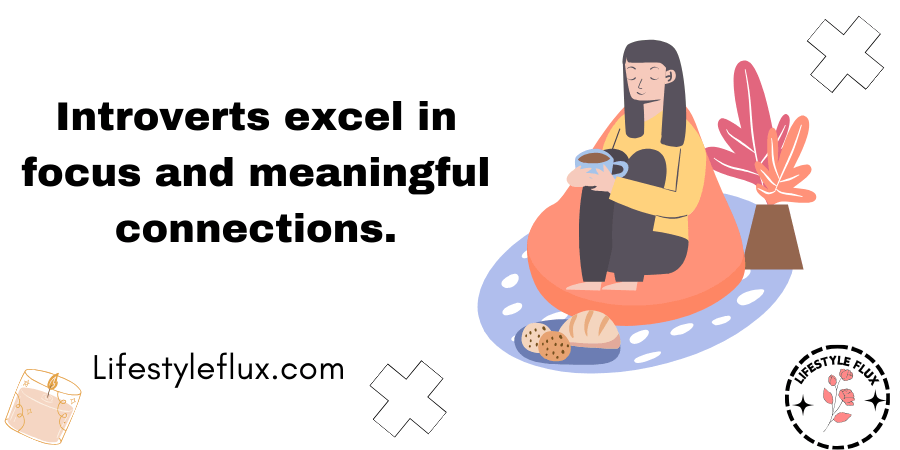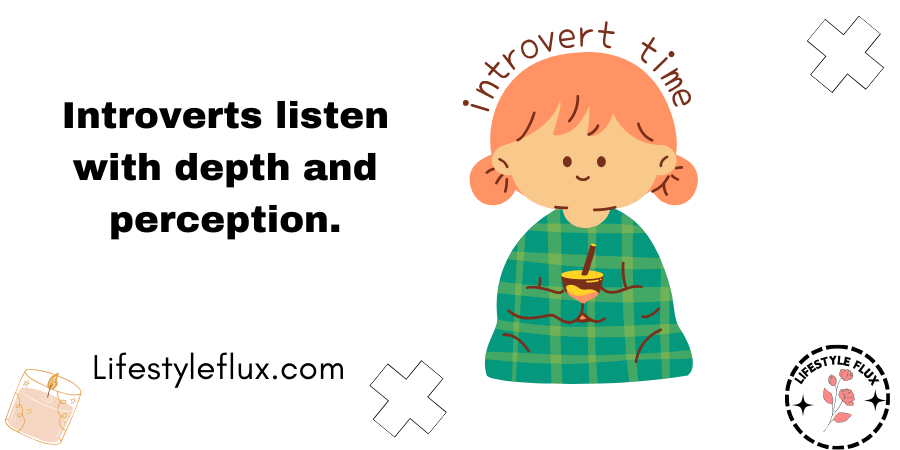In a world that often celebrates extroversion, introverts possess unique qualities that are equally powerful yet frequently overlooked.
10 Secret Strengths of Introverts That Extroverts Can’t Compete With delves into the remarkable abilities that set introverts apart.
From their heightened focus and creativity to their unmatched listening skills, introverts quietly excel in ways that make a lasting impact.
This article uncovers these hidden strengths, showcasing why introverts are a force to be reckoned with in both social and professional realms.
Table of Contents
1. Locking In
Have you ever had a conversation with someone who can’t stop staring at their phone? It’s frustrating when their attention is always divided. You never know if they’re listening.
You might feel ignored because it seems like they don’t care. If they did, wouldn’t they put their phone down and focus on you? Chances are they don’t think they’re doing anything wrong.
It’s common for extroverts to jump from person to person. Instead of committing completely to one interaction, they invest smaller amounts of energy in several different conversations.
This is one of the reasons extroverts enjoy small talk more than introverts.
When you’re having multiple conversations at once, it’s hard to dive into anything deeper than “How are you?” and “What’s new?”
Since most extroverts’ ideal conversation is quick and upbeat, they’re often browsing their phone or searching the room for the next person to chat with.

Introverts, on the other hand, specialize in locking in. Once you commit to a conversation, you don’t go anywhere else. You don’t split your attention or seek out more people to interact with.
You prefer to invest all your energy into one thing. While extroverts like their conversations short and sweet, you prefer one of two extremes. You either want something lengthy and meaningful or you want to avoid talking altogether.
It’s a common misconception that this difference means extroverts care less about their friends. Or that introverts don’t like meeting new people.
Neither is actually true.
Each side just has a hard time understanding the other’s point of view. Introverts think extroverts are missing out on the chance to form deeper bonds.
Extroverts think introverts are closing themselves off. What seems perfect for one is frustrating for the other.
2. Original Thought
While extroverts follow and often shape what is popular, introverts shine when going against the grain. Much of introvert’s notorious creativity stems from their independence.
You might simply spend more time by yourself. You may be more satisfied devoting hours to a hobby in isolation than connecting with the outside world.
This can shrink their social circle and lessen their knowledge of cultural trends, but independence paves the way for unique ideas and perspectives.
In the words of Nikola Tesla, “Originality thrives in seclusion, free of external influence beating upon us to cripple the creative mind.”
When you’re continuously absorbing the world around you, it can be difficult to separate individual and collective ideas.

But originality needs you to do just that. To think of, discover, or create something that hasn’t been done before. There’s a reason geniuses like Albert Einstein and Gregor Mendel, the founder of genetics, made their greatest discoveries in isolation.
Because you relish your solitude, you may have an easier time drawing original conclusions. Introspection comes more naturally to you.
Even though extroverts can be just as creative, introverts typically spend more time challenging and developing their ideas.
3. Enhanced Perception
Introverts frequently notice things that extroverts don’t. Because you’re more guarded and cautious, you would take more time to observe the world around you.
Instead of saying whatever pops into your head, you would carefully calculate your behavior. It’s relatively rare for you to say something you don’t mean or didn’t think through.
Otherwise, you wouldn’t have said anything at all. Before you open your mouth, you let all kinds of little observations contribute to your decisions.
You’re hyper-aware of everything, from what people are wearing to where they’re standing. But enhanced perception isn’t always a good thing.
On the one hand, you’re less likely to offend anyone or create any conflicts. Your thorough comments also make you seem intelligent and even profound.
On the other hand, you might sometimes come off as quiet or strange, especially in casual social interactions.
As an introvert, you put so much thought into every little thing that you might accidentally isolate yourself. It may be common for you to overthink and over-observe because you’re really good at doing both.
4. Provocative Listening
Your enhanced perceptiveness would also help you become a better, more provocative listener. Extroverts have a bad habit of waiting for their turn to speak.
They don’t digest what they’re listening to because they aren’t invested in the content. As an introvert, the content is the main reason you’re there. Your goal isn’t to socialize just for the sake of socializing.
You’re searching for something meaningful to make the conversation worth your time. That means you don’t just listen to their words. You don’t settle for face value.

You’re paying attention to their body language and tone. You’re reading between the lines and acknowledging subtext.
Through the conversation, you’re thinking of ways to add and expand to whatever they’re saying.
Some extroverts find this extremely frustrating. When they make a statement, they don’t expect you to challenge them or push them for more information. But that’s exactly what introverts do best.
5. Tolerating Boredom
Compared to the other items on this list, tolerating boredom seems like a pretty insignificant skill. But it’s a symptom of something much more substantial.
In general, introverts are more patient than extroverts. It’s no coincidence that so many of the best jobs for introverts requires an exceptional JOBS FOR INTROVERTS amount of self-restraint.
Programmers, engineers, and artists spend incredible amounts of time practicing, failing, and rethinking. A patient and persevering mindset is an absolute necessity to find any sort of success in these fields.
Otherwise, you’ll end up getting frustrated and throwing in the towel. Luckily, patience comes naturally for most introverts.
You have an easier time diving into your own thoughts. Slow, repetitive activities make extroverts restless, while you can find ways to stay engaged.
6. Rejecting Toxicity
Introverts are very picky about who they let into their world. Unlike extroverts, who prefer a large, diverse friend group, you probably have fewer, closer relationships.
It can take a long time for you to really consider someone a friend. There’s a lot more vetting involved than most people realize. But this cautiousness is what keeps toxic people out of your life.
Some extroverts will gain and lose friendships overnight. They may know very little about a lot of the people they hang out with. These shallow friendships can quickly turn toxic, causing all kinds of conflict.
You wouldn’t really consider these people friends, so you’d have no problem cutting them loose. There is one major downside to the way many introverts make friends.
As an introvert, you may cling to the same people you’ve known for years. This stops you from trying to make any new friends. Normally, this isn’t a problem, but what happens when an old friend turns toxic?
You can easily reject toxicity before it enters your life. But once it’s wormed its way in, you might have an especially hard time letting go.
7. Fostering Respect
Introverts excel at giving and getting respect. Whether you realize it or not, your attitude compels people to take you seriously.
By developing deeper connections, you leave a more lasting impact on the few people you get invested in.
Introverts lead rich inner lives, creating a sense of mystery and control. You may often be described as calm, confident, and secure.
Even if you barely say anything, your few comments are enough to communicate who you are. For people who talk all the time without saying anything, this can be incredibly intimidating.
If you’re a confident introvert, you won’t feel the need to prove yourself or boost your ego.
Your approval will feel like it carries more weight because people know you aren’t talking just to talk.
You may never be the center of attention, but confident introverts earn an incredible amount of respect.
8. Zero Dependence
Most introverts choose to work alone whenever possible. To be clear, you’re not bad at collaboration. In fact, some introverts are natural leaders, especially in small groups.
You may choose to work alone because introverts typically don’t like to depend on anyone. Many people think introverts have trust issues. Why else would you refuse to depend on other people?
The simple answer is you know you don’t need to. You want the driver’s seat for every project because you have the most faith in yourself. You know you don’t need supervision and won’t procrastinate.
You may have a particular vision and don’t want to explain it to anyone else. While this habit doesn’t make you the best team player, you are probably the most passionate and productive person in the room.
9. Heightened Concentration
Working in solitude also boosts your concentration. Introverts are far less prone to distraction than extroverts.
You may simply care less about many of the most common distractors.
Extroverts need to commit extended periods of time to socialize.
They’re happiest when interacting with other people.
While fun, it’s not the most productive use of their time. To make matters worse, they’re more susceptible to common time-wasters like social media. Introverts aren’t tempted in the same ways.
You’re energized and entertained by work, hobbies, and other solitary passions. It’s easier for you to stay focused because you enjoy engaging with your interests in isolation.
10. Preserving Trust
If you want to tell anyone a secret, tell an introvert. They’re fantastic at keeping secrets because they naturally value trust. If you’re an introvert, you’re already picky about who you connect with, which means you don’t just give your trust out to anyone.

So when someone tells you a secret, you know they’re putting their faith in you. They expect you to preserve their privacy because you would expect the exact same thing from them.
Introverts are also way less likely to gossip. Some extroverts use other people’s secrets to make themselves sound interesting.
They betray their friends’ trust because trust isn’t something they value as much. Introverts, on the other hand, will preserve one person’s trust over winning multiple people’s affection.
Conclusion:
Introverts may not always seek the spotlight, but their unique abilities prove they don’t need it to shine.
Whether it’s their heightened concentration, ability to reject toxicity, or a knack for original thought, introverts bring depth, creativity, and integrity to every aspect of life.
These ten traits highlight how introverts thrive in ways extroverts often overlook, making them indispensable in a world that values diverse talents.
So, the next time you encounter an introvert, take a moment to appreciate the quieter strengths they bring to the table—they may surprise you in ways you never expected.
Sources:
https://www.psychologytoday.com/us/blog/the-imprinted-brain/201704/solitude-is-the-school-of-genius
7 Distinct Advantages Introverts Have Over Extroverts
https://www.inc.com/ilya-pozin/4-reasons-why-introverts-make-great-leaders.html

Founder and CEO of Lifestyleflux.com, I bring years of expertise in self-improvement, wellness, and personal development to help you lead a happier, more balanced life. Through practical insights, eBooks, and consultations, I share actionable strategies rooted in experience and a passion for empowering others to unlock their full potential.

